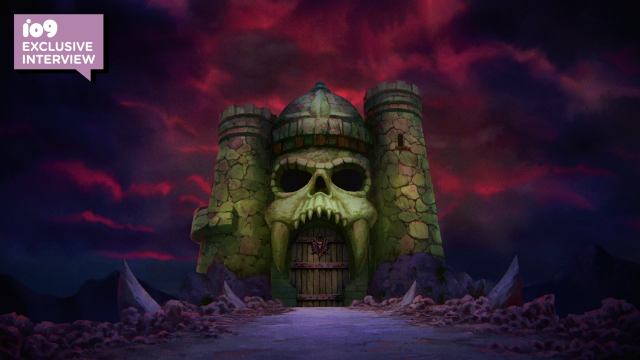Kevin Smith’s sequel to the classic He-Man and the Masters of the Universe ‘80s cartoon is an excellent (and frequently shocking) show, and Bear McCreary is part of the reason why. The composer, who’s scored The Walking Dead, Battlestar Galactica, and so much more, was a massive MotU fan long, long before he worked on Netflix’s Revelation, but that didn’t make his job easy. In this exclusive interview, McCreary explains the problem with the classic theme song, what made him cry, and the “ludicrous amount of work” it took to bring He-Man back to life.

[Note: The following interview has been edited and condensed for clarity.]
Rob Bricken, Gizmodo: Let’s just start with your history with Masters of the Universe. Were you a fan growing up?
Bear McCreary: I have a pretty extensive history with the brand, actually. I think Masters of the Universe might be the first fictional universe that I dove into. I am the exact age of the demographic that I think MotU was designed for — tied for first place, maybe, with Star Wars — but there’s no question that it was Star Wars and Masters of the Universe. When I was three to five [years old], those were my definitive toys and my fictional universes. I had the books, I watched the cartoon. I was born in 1979. So that means that by the time the Dolph Lungren [1987 Masters of the Universe] film came out, I’m what, eight? So it had a real magic to it. And in many ways, it was one of the absolute, defining gateways into fantasy that would probably influence the media I would consume as I got older, when I became a more discerning audience member.
io9: I could have almost said that verbatim. I was born in ‘77, and MotU hit me in that sweet spot too. So what’s the appeal of Masters of the Universe to you?
McCreary: For me, it is a gateway into a couple of genres, which I think is really cool. It has a unique mix of fantasy and science fiction. As I got older, I really got into hard sci-fi, novels, and movies — things like Aliens and Blade Runner and all that kind of stuff. And fantasy, especially Conan the Barbarian, Lord of the Rings, Willow, that kind of stuff. If you think about it, Masters of the Universe really draws from, and in some ways influences, a lot of those things. I think for me, what I like is that in a very unique way MotU exists in this perfect balance between two genres that don’t necessarily have a lot in common and boils it down. There’s magic and there’s technology, and they really are evenly balanced.
io9: If you’re busy, I could possibly just write this interview for you myself. I feel the exact same way.
McCreary: [laughs] I bet! Yeah, I can feel it just in talking to you. I mean, I think everybody has fond memories of Masters of the Universe. It was just one of the things in the ‘80s. But for people born between 1976-81, it means something else to us. It really is profoundly influential on us because we are the ones that never saw it as a corny or hokey thing, we only saw that looking back. But when [I was] four, Masters of the Universe was the coolest thing I knew.
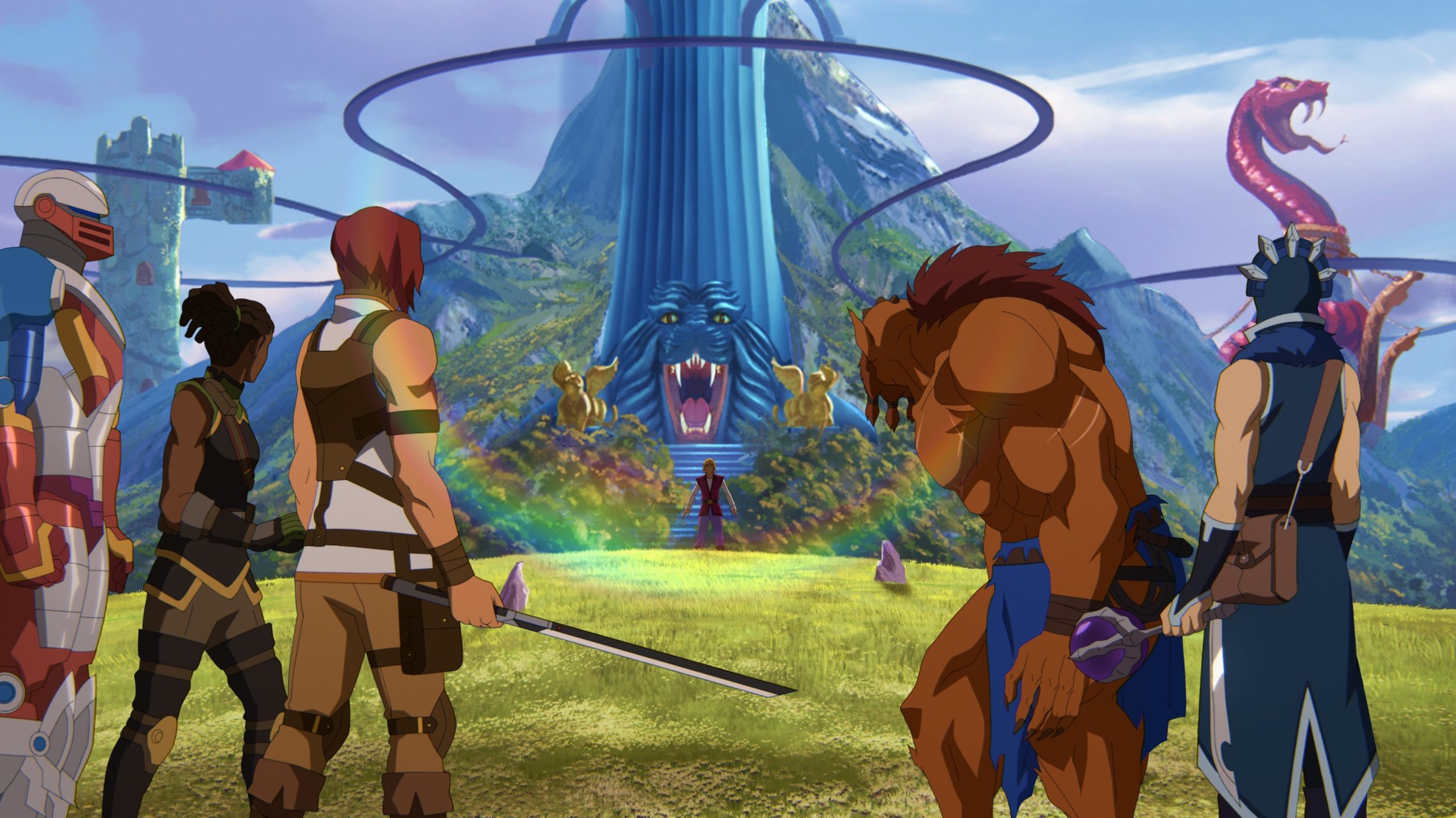
io9: We have a really strong memory of what the show was which is very different from what the show really was.
McCreary: Well, exactly. And I am sure I am jumping ahead of you in answering a question you’re going to ask, but I drew on the feelings [while making Revelation] you’re talking about. We have this feeling of what Masters of the Universe is in our hearts, and that is very much the show that Kevin and Netflix and Mattel made, and it’s very much the score that I wrote. Without directly referencing the show, [my score] more references the way we feel about our show and I think Revelation comes closer to capturing that in an actual visual medium than anything else I can think of.
io9: Yeah, it’s interesting. There have been so many adult reboots of these classic franchises and usually, they’re just grim and gritty. But it really amazed me how well Revelation bridged the gap between the show we saw as kids and the show we’re seeing as adults.
McCreary: I appreciate hearing you say that because that’s exactly what everybody was going for, and I share your admiration for what the writers and Powerhouse [Studios] created. I mean, not to diminish my own contributions to it, but the visuals and the scripts and the acting all existed before I got involved, and they really did find this incredible balance. And it’s definitely not a reboot. But it appeals to people that have aged since the last time they saw it.
io9: It was being billed as a sequel for a long time, which confused me — like, how do you make a sequel to a show that never had serialized story to continue, and has aged really poorly, unless you’ve got nostalgia for it? But when I saw Revelation, I understood how the show could manage both things.
McCreary: Yeah, it really can, and I think they didn’t break canon in any ways that are significant. Instead, I feel like they took the implied stories from the classic Filmation series and extrapolated them out, and expanded upon relationships. I’m biased, obviously, but I think this is one of the more skillful reimaginings or continuations that has come out in decades. I mean, I think about other blockbuster [series] from the ‘80s that wish they could do what this show is doing with their brand.
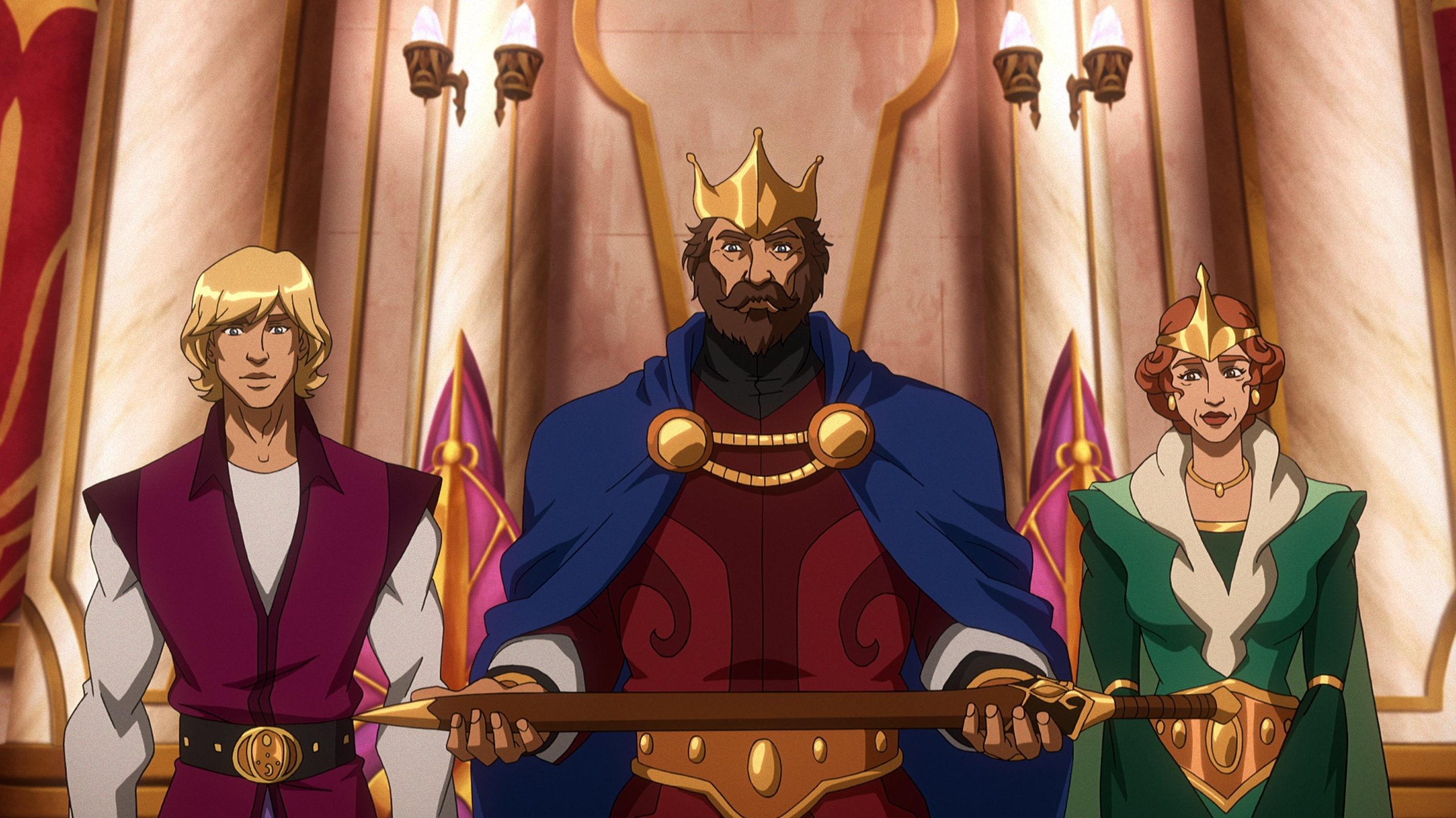
io9: It’s staying true to our nostalgia in a way that I’ve not seen anyone else manage to pull off.
McCreary: I think part of the reason they were able to do it is it was the right combination of platform and budget, meaning there weren’t $US200 ($272) million dollars on production and $US200 ($272) million on marketing being spent. So you could take some risks. You know what I mean? Then you had Kevin [Smith], who the creatives trust, the executives trust, everybody trusts, and he protects the ideas and that’s what you need. You need someone that will allow his actors, his writing staff, his composer, his animators to kind of come to the table and say, “Oh my God, this is my dream project. This is what I want to do. Please protect me from network notes!” And he did.
io9: I talked to him recently, and it sounded like Netflix kept him in a corral of what they considered what was and was not He-Man, but they gave him free rein within that. What that the same for you?
McCreary: Absolutely. And it is worth saying that the proverbial network notes, I don’t think were a big issue on this show. I think that Netflix was incredibly supportive, and I would say that my experience probably mirrors most people [who worked on the show]. I feel like they got all the right people in, and when you have the right person who’s incredibly passionate, you just need to kind of make sure they’re heading in the right direction, and then let them do their thing. It was an incredibly collaborative experience but also I came at this thing running 161 km an hour and was given a lot of freedom to do the score that I’ve always wanted to hear.
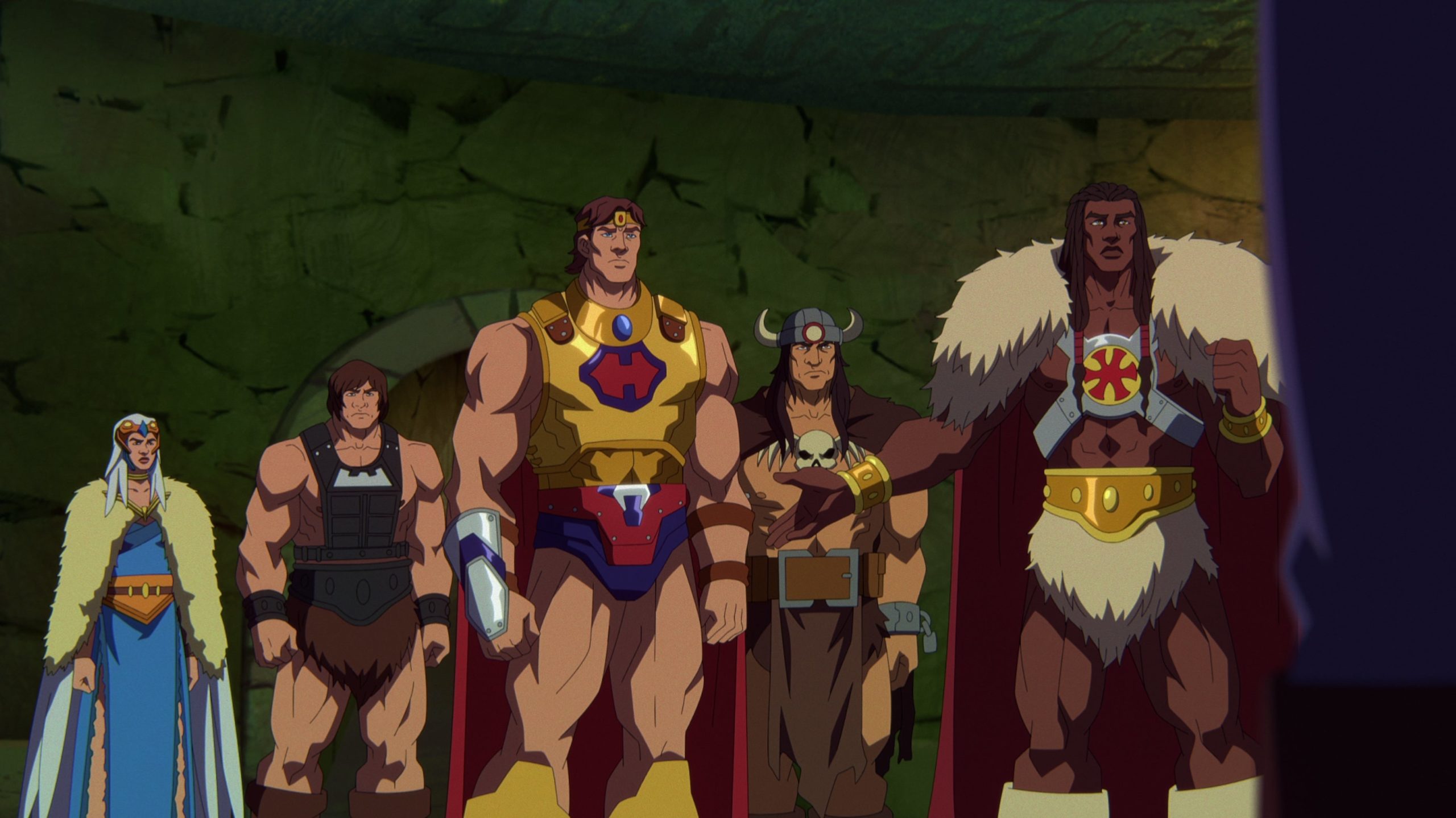
io9: Where do you begin scoring a show like this?
McCreary: Well, in my first meeting with Kevin, and Rob David from Mattel — before I was hired — I hadn’t even seen anything, or read anything from Revelation. I knew nothing other than they were making a new show. But in a weird way, I already knew what I wanted to do. I wasn’t really auditioning for the job, it was more like, “I’m going to tell you what I want to do. And if that scares you, I’m not the guy for this show. Like, literally do not hire me because I won’t do anything that fits.” And I started talking about the influences that I always wanted to have and all of us were instantly on the same page.
When I said that, I didn’t really want to reference the music from the Filmation show. I know that the theme song is beloved but beyond that, the score is so dated and of its time. I told them, “I want to make the score that I feel like I remember [from the show] — the score that would make me feel like a kid again.” And for me, that’s referencing Conan the Barbarian by Basil Poledouris, which I’m going to say is the greatest fantasy film score of all time. My idea was, what if Basil Poledouris had hired early ‘80s Metallica to be in the orchestra when he scored Conan the Barbarian?
io9: Wow.
McCreary: So it’s Conan the Barbarian. It’s Ivan Reitman’s Heavy Metal movie, that kind of vibe. And I basically said, “If that is not exciting to you, then we’re not going to work well together.” Instantly, Kevin starts singing the love theme from Conan, and I look him in the eye and I said, “Kevin, I’m going to have to do your show now.”
The next step after they hired me and I was able to watch the episodes and really digest how epic the story is, and I saw how well-written it is and well-performed it is, I realised I needed a bunch of characters [themes]. And the real challenge with the first episode is that it’s sort of like a season finale for the ‘80s iteration of He-Man and the Masters of the Universe.
io9: I hadn’t thought about it that way, but you’re absolutely right.
McCreary: It really is. The challenge there is, in a season finale, Man-at-Arms shows up and you play his theme. Evil-Lyn is there and you play her theme. Teela takes her tiara off and you play her theme. You just get snippets — you don’t get big reveals, you don’t have big origin stories, you just have these moments. And I realised that I needed to have all those themes in place in the first episode, even if you only heard them for a few seconds. So among those themes was a theme for Adam and He-Man. I had a theme for Skeletor, Man-at-Arms, Beast Man, Battle Cat, Evil-Lyn, Orko, Grayskull — those are all in the first 12 minutes. And then a few other themes trickle in as the show goes on, but basically, it’s all there.
I had mapped out the entire show, where I was going to take all these themes, what they were going to do, where they were going to evolve, and I had to write them all at once. Which was a ludicrous amount of work, to be honest with you. It was months of figuring out what all these different themes were, just so that I could quote them for a couple of seconds. It’s just that they pay off in big ways as the show unfolds.
io9: What about He-Man’s transformation sequence, specifically?
McCreary: After I’d done all of that work, I was able to implement [He-Man’s theme] into the transformation sequence, which I thought was the best way to sort of demo out this idea of the symphonic orchestra-meets-heavy metal kind of sound. I wanted to write a theme that really fit our new version of Adam; I had always envisioned this heroic fanfare sitting on top of a Metallica riff, and if you listen to the scene with that in mind, that’s kind of what it is. There are these heavy grooving guitars and celli and basses playing this riff that is very iconic of He-Man. Then there’s this very heroic theme, which is pretty traditional. I’m not trying to break the mould here.
I wanted to write something that feels very cinematic, but that also has some layers and some nuance. And this is ultimately why, to answer your question that you haven’t asked, didn’t I use the old version? The reason is I found the old theme is so innocent, and so pure, and so distractingly nostalgic, that it started to take away from the emotional impact. There’s no better example of this than in the end credits of the first episode, where we’ve heard this heroic He-Man theme until the end, but then it essentially plays like a funeral. It’s a solo French horn playing that uplifting fanfare that I wrote for He-Man and Adam, set against these ominous drums that are soaked in reverb, like they’re far away, like you’re watching a military funeral. I needed a melody that had a certain melancholy to it, that had a certain darkness to it, because ultimately [Adam’s] secret destroys relationships. It shatters the world of our characters. The innocence is lost.
That [classic] theme represents innocence, not only to people at our age but even just on a technical level, a harmonic and melodic level. It’s so happy and uplifting and exciting that I just found it wasn’t going to fit. I know there are going to be fans that take issue with that and for them, I say that I love that old theme as much as they do. I initially couldn’t imagine the show without it. But once I really wrapped my head around Revelation, I realised that the music needed to tell this story needed a different kind of main theme.
io9: Building a framework inside the theme that could represent that eventual darkness sounds like a real tough needle to thread, especially since the show starts so innocent and reminiscent of the classic ‘80s series.
McCreary: Yeah, [but] multiply that times 10 because every character has that! This is sort of like a spoiler-y interview, right?
io9: Yes, through the first five episodes.
McCreary: So we meet Orko. He’s doing his old Orko stuff. He’s doing a magic trick, and it goes awry, and it very much plays like the Orko that we know and remember. The theme that I wrote for him is a bullseye for that. Then, at the end of episode one, he shows up in a heroic context and actually tees up an arc that plays out over more episodes. That same theme that was goofy and comedic, [then] had to play strong and heroic. I wanted it to be a literal reiteration of that theme. I really wanted even casual audience members — maybe it takes them a viewing or two to piece together that every time Orko shows up — [to realise] it’s the exact same theme that makes you kind of roll your eyes and laugh on the first scene but gives you an adrenaline burst on his second scene. From there, it continues to evolve — that was hard. It was not easy to get that mileage out of a theme. That’s why I spent months writing themes, and I would just sit with them. “The funny version works. But can I make that emotional? [No,] that doesn’t work.” So I had to go back to the beginning and try to find a way to be able to tell the story.
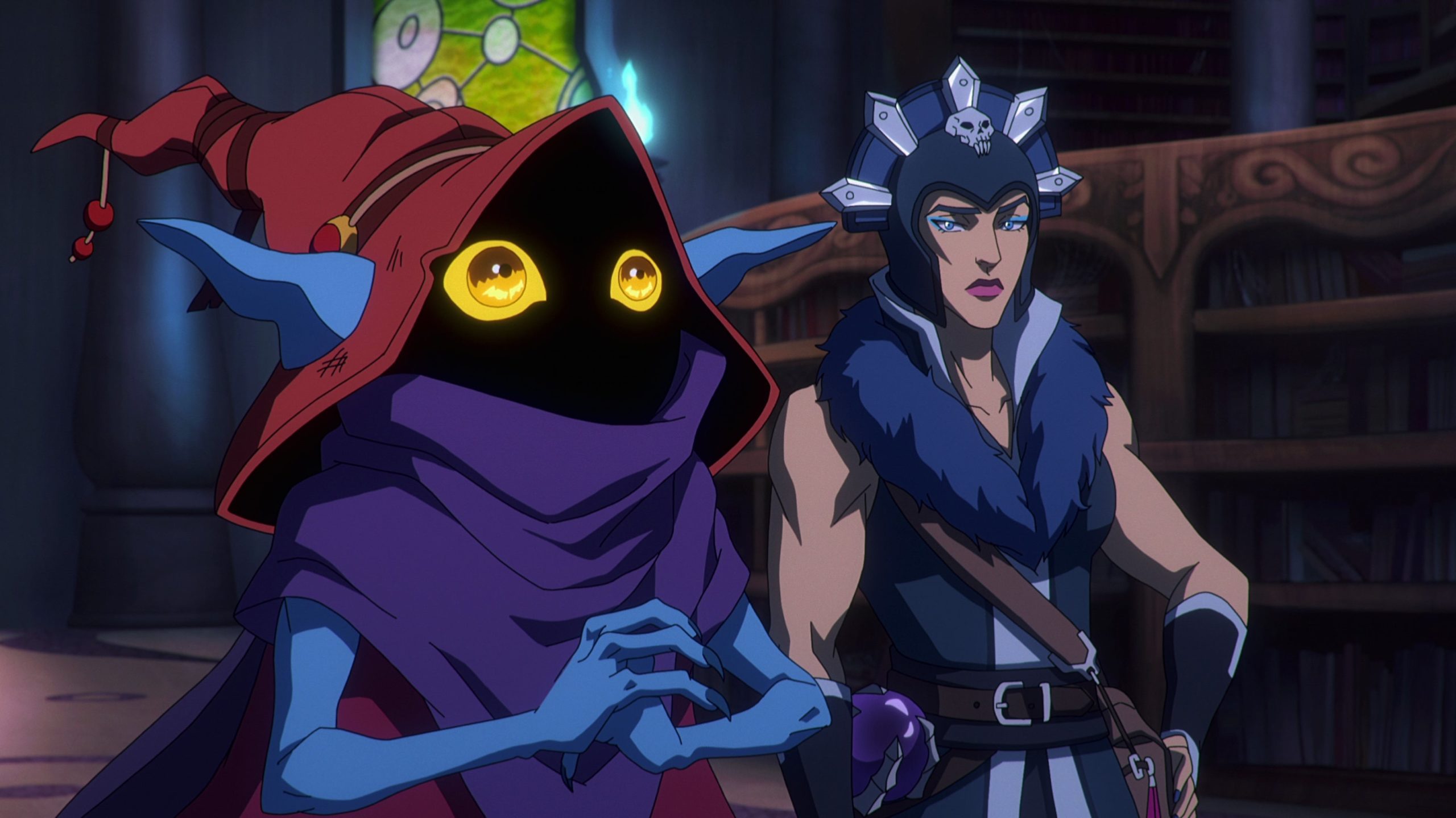
io9: I knew you were going to mention Orko’s scenes. I cannot stop thinking about when he opens up to Evil-Lyn. I couldn’t believe I was watching a show where Orko had pathos and it worked.
McCreary: And it works!
io9: I mean, Orko was annoying even back when we were kids because he was unfunny comic relief and always messed things up, which was frustrating. But all of a sudden, in Revelation — even before he has his huge, heroic moment — he’s talking about his feelings and doubts and fears, and it genuinely touched me.
McCreary: Yeah, and the scene in episode three when we encounter him in Man-at-Arms’ hut and he’s sick is another knockout. I didn’t even mention Stephen Root’s speech as Cringer in episode two, when Teela’s going to turn her back on being a hero. I’m getting chills even thinking about it. It’s so great that all these characters that were very archetypical in the ‘80s — Cringer is called Cringer because he’s a scaredy-cat — that the show gets to explore them without fundamentally changing them. That’s the brilliant thing. Cringer’s still Cringer, it’s just that the writers came up with circumstances that would push all of these characters beyond their limitations and force them to confront things emotionally that they never had to in the old show, which really makes it feel like they’re still the old characters. They’re just exploring new sides of themselves, and we’re able to see that. There are just some wonderful character moments.
The funny thing about the show, and this continues into the [later] episodes, is that every episode gets better. That means the first episode is literally the worst one — and it’s great — but they just get better and better and better and I think that’s the sign of a great creative team that isn’t scared of getting notes or scared of audience expectations and just going for it. That’s the creative environment I like to feel.
io9: Well, in terms of defying audience expectations, the end of episode five is particularly outrageous.
McCreary: That’s the one, dude! I called Kevin when I was done writing episode five, and I think I was crying. I told him, “This is one of those scenes that I’m going to remember the rest of my life.” I got to score that. And I feel like that so rarely. I think it is well-executed and shocking and beautiful and I get chills just thinking about it. That’s a gift you can give a composer, a scene like that.
io9: Speaking of crying, how did you feel when Kevin Smith posted the video of him tearing up while watching the transformation scene paired with your score?
McCreary: It was pretty amazing. Normally a composer announcement is among the last things that ever happen. I just think Kevin and Netflix and Mattel were genuinely jazzed when I sent that first transformation cue and the main title that made the extended prologue that opens the first episode — those are the two cues that I sent first. There was a lot of enthusiasm there, which was great.
io9: Well, I think the Venn diagram of adult He-Man fans and people who are excited about Bear McCreary scores make a single circle.
McCreary: [laughs] It gets to what I was saying, where it’s so rare that you work on a project and you just feel like every single person you’re working with was born to work on this thing. Look, I’m very fortunate to be in this position. A lot of composers would love to score this and a lot of them would do a great job. But I also feel like when I got the call, I felt this almost this overwhelming sense of “I was born to do this. I’ve been thinking about this since I was four.” I almost felt like I could help other people understand why we like He-Man and it wasn’t ironic, you know?
io9: Absolutely.
McCreary: I got to work on a Star Wars game for Oculus. I love doing Star Wars stuff. It’s great. But there’s no question in popular culture that Star Wars is good. But He-Man is in a different position. I think it’s safe to say he is more a meme than a character to most people. I’m hoping that that can change with the Netflix show — that it will get some people to at least understand why we loved it when we were kids.
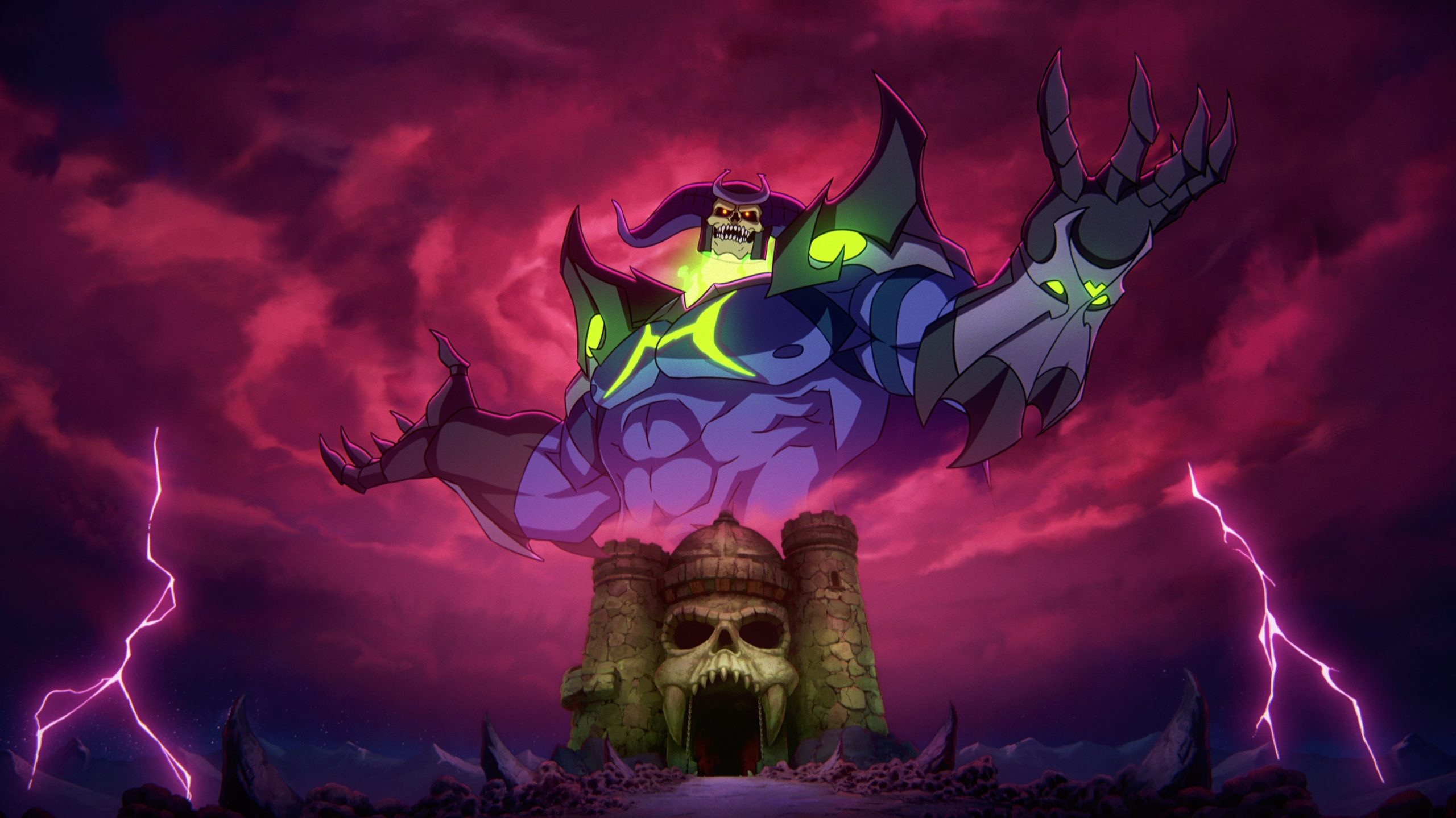
io9: Is there anything else you want to tell people about the score?
McCreary: Yes, I think it is also worth mentioning that this is recorded and performed by a live orchestra and choir. There’s a level of acoustic authenticity that I enjoy writing for, and it is somewhat rare in the medium. I watch a lot of animated series, and some have orchestras and many have an orchestra once in a while. But I really wanted to see, almost as an experiment, what it would sound like if I scored an animated show. I just did it the only way I really know how to do things, which is with a big acoustic sound. I think it will help bring a level of emotion and realism to the audience that they might not even notice on a conscious level.
However, even though there’s a metal band playing with a big bombastic orchestra, I don’t think of this as a throwback score, and I’m not playing for laughs. I just genuinely think this sounds awesome and it’s a language that can be contemporary and cool. I’m hoping that it kind of rides that line where it’s fun and it makes you smile, but it also genuinely should get you pumped up and genuinely make you feel the stakes and the emotion, and feel them in a modern way.
io9: Do you have any favourite pieces from your score?
McCreary: Oh my god. So many. Whenever you ask a composer what their favourite music is, they’ll usually say it’s the thing they’re working on. And I must say that Revelation’s finale, episode 10, is the payoff of every theme that I wrote in every way. So my favourite pieces are all in that episode. Sorry that you haven’t heard it! However! In the first five episodes, there are some wonderful moments and I really enjoy some of the quieter, unexpected ones. I already mentioned the end credits of episode one, and the end credits of four have an unexpected vocal performance by my wife, Raya Yarbrough, who sang the Outlander theme. And she’s singing a melody with lyrics that are a Latin translation of “By the power of Grayskull.” It’s nothing brilliant, but it’s really evocative and beautiful. And I think that there are some other really quiet moments in episodes three and four with Orko’s dialogue scenes.
I’m citing these not because they’re the most exciting, not because they’re even my best music, but they are places where, as a dramatist, I had a lot to do and a lot to contribute. And they’re so unexpected in a show like this, for it to slow the action down and get into some really moving character interactions. In a way, that’s what I think makes this a great show — not just a great cartoon, but a great show.
The digital album of the Masters of the Universe: Revelation soundtrack is available now. The first five episodes are streaming on Netflix.
